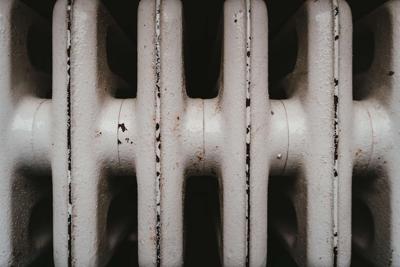
Cold spots on your radiator? Rooms slow to heat? It could be sludge that’s the problem.
Sludge is a build-up of rust and dirt in your heating system that can cause problems for boilers and prevent radiators heating properly.
Sludge sits at the bottom of your radiator, so if your radiatorCetnrs are hot at the top but cold at the bottom, it’s likely sludge is the cause.
You can remove the radiator and wash the sludge out, but the most effective way is to get a power flush.
Power flushing cleans the entire central heating system, including pipes, radiators and the boiler.
Why Is Power Flushing Important?
Over time, central heating systems can become clogged with sludge and other debris that can accumulate in the pipes and radiators. This build-up can lead to reduced system efficiency, higher energy bills and even cause your system to break down.
Power flushing removes the stuff that shouldn’t be there and helps restore your system to its best performance. Older systems, in particular, might require power flushing.
How Does Power Flushing Work?
The heating engineer will pump a specially formulated chemical cleaning solution into your system using a high-pressure, high-flow-rate pump. This loosens and removes any accumulated sludge, rust, or other debris. In older systems it may need to be repeated several times.
The engineer will isolate the system and drain it of any water. The cleaning solution is then added to the system and pumped through at high velocity, loosening debris. The sludge and debris is collected in a filter.
The chemical solution is circulated until the system clean. Finally, it’s flushed with clean water, and refilled, with a corrosion inhibitor added.
Do I Need Power Flushing?
You should consider power flushing your central heating system if you notice any of the following signs:
- Cold spots on your radiators
- Reduced efficiency or slow heating
- Noisy pipes or boiler
- Dirty water when you bleed your radiators
- System breakdowns or failures
A drop in water pressure can also be the sign of needing a power flush, but it could also be the sign of a leak in the system. If you spot a leak, then you’ll need to get in touch with a plumber. If it’s a major leak, turn off the water and call emergency plumbers as quickly as possible.
Additionally, if you're having a new boiler installed or any parts of your central heating system replaced, it's a good idea to have it flushed to ensure the best performance from the start.
Can You Power Flush Your Central Heating System Yourself?
Unless you have the appropriate knowledge, experience and equipment, it's not a good idea to power flush your central heating system yourself.
Power flushing can be risky if not done correctly, especially if you have an old heating system. It's better to hire a professional who can ensure that the process is completed properly and who knows what to do in the case of an emergency.
The engineer will also advise you on the right solution for your specific heating system.
How Often Should You Power Flush Your Central Heating System?
The frequency of power flushing will depend on a range of factors, including the age and condition of your central heating system and the water quality in your area. For example, if you live in an area with hard water or other water quality issues, you may need to power flush more frequently.
The best advice is to speak to a professional who can advise you on your specific circumstances.
Regular maintenance and upkeep of your central heating system can also help to prevent the build-up of contaminants and reduce the need for power flushing.
This includes regularly bleeding your radiators, checking your boiler pressure and having your boiler and heating system professionally serviced on a regular basis.
Final Thoughts
Power flushing is an important part of keeping your central heating system in its best shape. Removing debris and other contaminants can improve overall performance, reduce energy bills, and prevent expensive breakdowns and repairs.
If you're experiencing any of the above or if it's been several years since your last power flush, it's worth considering getting in touch with an engineer to get your system professionally flushed.



(0) comments
We welcome your comments
Log In
Post a comment as Guest
Keep it Clean. Please avoid obscene, vulgar, lewd, racist or sexually-oriented language.
PLEASE TURN OFF YOUR CAPS LOCK.
Don't Threaten. Threats of harming another person will not be tolerated.
Be Truthful. Don't knowingly lie about anyone or anything.
Be Nice. No racism, sexism or any sort of -ism that is degrading to another person.
Be Proactive. Use the 'Report' link on each comment to let us know of abusive posts.
Share with Us. We'd love to hear eyewitness accounts, the history behind an article.